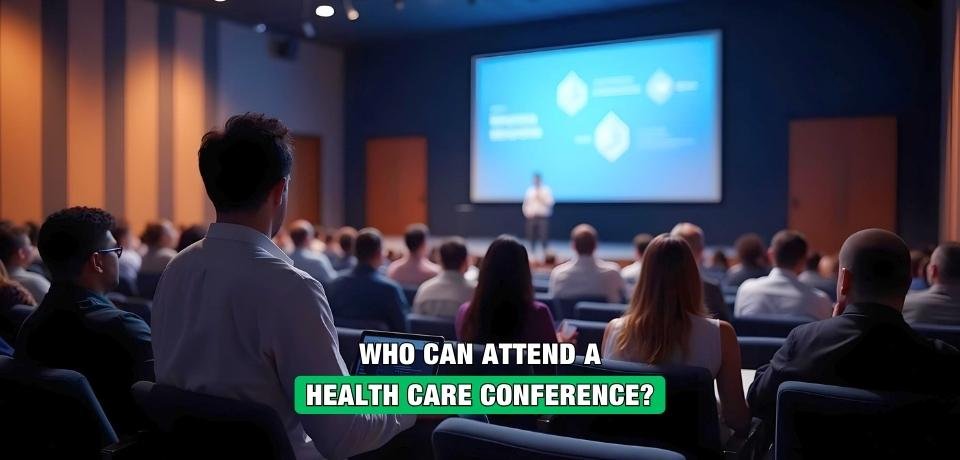You can gain valuable insights, learn about advancements in the medical industry, and establish valuable connections by attending a health care conference. But who can attend a health care conference? It’s not just for experienced professionals—these events welcome a wider audience than you might think.
Whether you’re a medical professional, student, researcher, or even an enthusiastic learner interested in healthcare trends, you can participate. The inclusive nature of these conferences allows anyone keen to learn about healthcare to join, making it an open and informative experience.
Want to discover more about eligibility, benefits, and registration? Keep reading to explore everything you need to know about who can attend and how to make the most of a health care conference.
Eligibility Criteria for Attending Health Care Conferences
Attending a health care conference can be an enriching experience, but you should know if you’re eligible to participate. Here’s what you need to know about the criteria to join these insightful events.

Professional Background
Most health care conferences are open to professionals in the medical, nursing, pharmacy, and therapy fields. If you’re currently working in the healthcare sector, you’re eligible. Some conferences even welcome administrators and policy-makers to discuss broader issues affecting healthcare.
Educational Qualification
Students pursuing medical or healthcare-related degrees can often attend as part of their professional development. Many events offer special sessions customized to students’ needs. You may need to present a valid student ID or proof of enrollment during registration.
Research Experience
Researchers and academics are key attendees at health care conferences. If you’re involved in healthcare research, presenting findings or simply participating is encouraged. Conferences provide a platform to exchange ideas, gather feedback, and explore collaborative opportunities.
Public Health Enthusiasts
You don’t have to be a healthcare professional to attend. Anyone interested in healthcare trends, technology, or patient care is often welcome. These conferences aim to inform and engage a broad audience, making them accessible to many.
International Participants
Many conferences welcome international attendees. However, make sure you have the necessary travel documents, such as a visa or an invitation letter. This allows for a more diverse range of perspectives and ideas, enriching the discussions.
If you meet any of these criteria, you’re likely eligible to attend. Register early and be part of a transformative learning experience.
Who Can Attend a Health Care Conference?
Health care conferences are excellent platforms for gaining knowledge, sharing insights, and building valuable connections. Here is a list of individuals who can attend health care conferences.

Healthcare Professionals
Doctors, nurses, pharmacists, and therapists are the core attendees at these conferences. They attend to learn about new treatments, medical technologies, and growing healthcare practices. Such events offer them the chance to refine their skills, discuss challenges, and collaborate on solutions with experts from around the world.
Medical Students
Health care conferences provide an exceptional learning opportunity for medical students. They can attend workshops, listen to expert talks, and observe real-world case studies, which offer insights beyond textbooks. Interacting with experienced professionals helps students build networks, understand practical healthcare issues, and figure out their career paths.
Researchers and Academics
Researchers and academics play a significant role in healthcare innovation. Conferences provide them with a platform to present findings, gain feedback, and explore collaborative research opportunities. In particular, health care conferences in Canada promote networking with global researchers and contribute to innovative developments.
Healthcare Administrators and Managers
Conferences aren’t limited to clinical roles; administrators and managers are also crucial participants. They attend to learn about healthcare management, policies, and technology that can improve hospital operations. These events allow them to explore solutions for better patient care, facility efficiency, and staff management.
Tech Innovators and Entrepreneurs
Healthcare startups, tech innovators, and entrepreneurs are increasingly attending health care conferences. These events offer them exposure to current healthcare needs, enabling them to develop effective solutions. Networking with healthcare professionals helps innovators fine-tune their products to better serve the industry.
Government Representatives and Policymakers
Health care conferences often welcome government officials and policymakers, especially at events focusing on public health and policy reform. These participants gain valuable insights into healthcare challenges, new technologies, and policy developments, helping them create informed policies for better healthcare access and delivery.
General Enthusiasts
You don’t need a medical background to attend a health care conference. If you have a genuine interest in healthcare trends, innovations, or wellness topics, you’re welcome. Such conferences provide general enthusiasts with a better perception of the sector, making it a worthwhile experience.
Health care conferences are open to a broad spectrum of participants, each bringing unique perspectives to the table. If you’re passionate about healthcare and eager to learn, attending one could be highly rewarding.
Why Attend a Health Care Conference?
Attending a health care conference can be an enriching experience, whether you’re a student, professional, or simply curious about the sector. These events offer far more than lectures—they provide a platform for growth, networking, and real-world learning. Here’s why you should consider attending.
Knowledge Expansion
Conferences offer a chance to learn about the latest developments in healthcare, including innovative treatments, emerging technologies, and developing policies. You’ll hear directly from experts, allowing you to gain deeper insights into complex topics. It’s a perfect setting for staying updated with current trends and practices.
Skill Development
Attendees can participate in interactive workshops and hands-on sessions that focus on practical skills. These activities not only reinforce theoretical knowledge but also teach real-world applications. You’ll leave with new tools and techniques to apply in your career or studies.
Networking Opportunities
Conferences bring together professionals, researchers, students, and industry leaders from different areas of healthcare. This creates a wonderful chance to connect, collaborate, and share experiences. Building relationships at these events can open doors to future job opportunities, mentorships, and collaborative projects.
Career Advancement
Whether you’re seeking to shift your career path or grow within your current role, conferences provide valuable insights and resources. The benefits of healthcare conferences for professionals are numerous, as they offer exposure to emerging trends, new career paths, and developing industry demands. It’s an excellent way to broaden your professional horizons.
Inspiration and Motivation
Listening to success stories and breakthrough innovations can be incredibly motivating. Conferences often feature speakers who’ve made a significant impact in healthcare. Their stories can inspire you to pursue new goals and contribute meaningfully to the industry.
Make the most of the opportunity to grow both personally and professionally. Attending a health care conference can make a huge difference to your career and your knowledge.
What to Expect at a Health Care Conference?
Attending a health care conference can be both exciting and enriching. These events are packed with activities designed to boost your knowledge and develop your professional skills. Whether you’re a student, professional, or enthusiast, here’s what you can expect.
Insightful Presentations
Expect to hear from industry experts as they share insights on medical advancements, healthcare policies, and patient care techniques. These presentations often feature data-driven case studies and discussions that shed light on current trends. You’ll leave with a deeper understanding of innovative practices and solutions.
Interactive Workshops
Workshops are a major highlight, offering hands-on training in various healthcare skills. They focus on practical topics such as patient handling, medical technology use, or healthcare management. These sessions encourage active participation, helping attendees gain valuable skills and real-world experience.
Networking Sessions
Conferences create ample opportunities to meet and connect with professionals from different fields. Engaging in conversations and exploring networking opportunities at healthcare conferences can lead to potential collaborations and long-lasting relationships. These interactions not only benefit your career but also expand your knowledge base.
Innovative Exhibitions
Be ready to explore exhibitions showcasing the latest medical devices, software, and healthcare solutions. This is where you can see innovative technology in action, learn about product features, and understand how these tools are revolutionizing healthcare practices.
Research Presentations
You’ll find numerous research-focused sessions where professionals present their studies and findings. These presentations often include panel discussions that allow participants to ask questions and engage in meaningful debates, promoting a deeper knowledge of various healthcare topics.
Interested in Attending a Health Care Conference? Here’s How to Register
Registering for a health care conference might seem complex, but it’s actually a simple process when you break it down step by step. Whether you’re a student, professional, or curious learner, knowing how to register can help you secure a spot without hassle.

Step 1: Find the Conference Website
Start by searching for the official website of the conference you want to attend. It’s the most reliable source for registration details, schedules, fees, and guidelines. Make sure to review the event’s agenda and target audience to ensure it aligns with your interests.
Step 2: Fill Out the Registration Form
Once on the website, locate the registration page and complete the form with accurate details like your name, email, and professional background. Some forms may ask for specific information, like your medical specialization or institution. Double-check your entries to avoid any delays or rejections.
Step 3: Choose Your Attendance Type
Conferences often offer various participation options, such as in-person, virtual, or hybrid. Select the one that best suits your availability and budget. Be mindful of any deadlines associated with early-bird pricing or discounts for students.
Step 4: Make the Payment
After selecting your attendance type, proceed to payment. Conferences usually offer multiple payment options, such as credit cards, PayPal, or bank transfers. Ensure you receive a payment confirmation email as proof of registration.
Step 5: Wait for Confirmation
You’ll receive an email confirming your registration, along with an event ticket or log in details for virtual attendees. Keep this email handy and save any attached documents for smooth access to the conference.
Tips for Making Health Care Conferences a Success
Health care conferences offer countless opportunities to learn, connect, and grow. But to truly benefit, you need to approach them strategically. Here are some practical tips to make your conference experience both meaningful and rewarding.
- Plan Your Schedule: Review the conference agenda in advance and prioritize sessions that align with your interests or career goals. This helps ensure you don’t miss valuable discussions.
- Engage with Speakers: Don’t hesitate to approach speakers after sessions. Asking questions or sharing insights not only builds connections but also deepens your awareness of the topics discussed.
- Network Actively: Be open to conversations during breaks, lunches, and networking events. Introduce yourself, exchange business cards, and connect with other attendees on LinkedIn.
- Attend Workshops: Participate in interactive workshops for hands-on learning. These sessions often provide practical skills and deeper insights than traditional presentations.
- Take Notes: Bring a notebook or use a digital device to write down key points, ideas, or questions. This helps retain information and serves as a reference for future use.
- Join Group Discussions: Engage in panel discussions and Q&A sessions. Sharing your perspective and hearing others’ opinions enriches your learning experience.
- Stay Connected: After the conference, follow up with contacts and engage with them through email or social media. Building relationships is key to long-term benefits.
- Reflect on Learning: Take time to reflect on what you learned and how you can apply it to your career or studies. This makes the experience more impactful.
By following these tips, you’ll maximize both learning and networking opportunities at health care conferences, making the experience truly worthwhile. Don’t just attend—immerse yourself, engage actively, and gain valuable insights.
Frequently Asked Questions
If you’re considering attending a health care conference, you might have some additional questions. Here are some common FAQs to help clarify your doubts and make your decision easier:
Can Non-Medical Professionals Attend A Health Care Conference?
Yes, non-medical professionals can attend. Conferences often welcome consultants, educators, and tech specialists, especially when discussing healthcare innovations, policies, or technology solutions. It’s a great learning opportunity for those exploring healthcare from different perspectives.
Are International Attendees Allowed At Health Care Conferences?
Absolutely! Many health care conferences encourage global participation. International attendees are welcome to share insights and learn about healthcare trends worldwide. Just ensure you have the necessary travel documents, such as a visa or invitation letter, if required.
Do Health Care Conferences Offer Certification Or Credits?
Yes, many conferences offer certificates or Continuing Medical Education (CME) credits. These certifications validate your participation and may be useful for professional development or meeting educational requirements in your respective field.
Is There A Specific Age Limit To Attend A Health Care Conference?
Generally, there is no strict age limit. However, most conferences recommend that attendees be at least 18 years old. Students of legal age interested in healthcare are also encouraged to attend, making it an inclusive learning platform.
Can I Bring A Guest To A Health Care Conference?
Yes, many conferences allow attendees to bring a guest, like a colleague or partner, for networking events or sessions. However, they may need separate registration, so check the event’s policy to ensure compliance and eligibility for guests.
Conclusive Words
Health care conferences can be a rewarding experience, offering valuable insights, opportunities for learning, and the opportunity to network with colleagues. If you’re still wondering who can attend a health care conference, remember it’s not just for experts; anyone passionate about healthcare can join.
From students and researchers to non-medical professionals, conferences are open to diverse participants. The inclusive environment encourages learning, collaboration, and skill development, no matter your role or level of expertise.

Leave a Reply